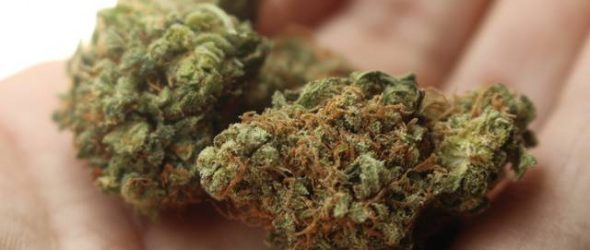GLEN CARBON — In a 4-2 vote Tuesday, Glen Carbon prohibited the sales of recreational, or adult-use cannabis within the village. Trustees Susan Jensen and Bob Marcus voted against prohibition.
The village’s mayor and trustees hit the road for the second trustee meeting of October, this time visiting Eden Village.
Glen Carbon Police Chief Todd Link has not been in favor of allowing such sales, for logistical reasons.
“I base my recommendation not on any grounds of morality, but, instead, on logistical concerns and an appreciation for the potential risk and liability posed to the village should federal law enforcement authorities choose again to enforce cannabis laws,” he said.
Link’s main concern arises from the fact that cannabis cultivation, distribution and possession remain a violation of federal law.
He believes that until this legal ambiguity is resolved, Glen Carbon could be viewed as aiding and abetting in federal crimes should it facilitate cannabis businesses which are then investigated and prosecuted by federal law enforcement authorities on yet unchanged federal laws prohibiting cannabis cultivation, possession and distribution.
Additionally, since federal law still views cannabis-based business as unprosecuted federal crimes, banks are limited in their handling of money from these businesses.
“This creates an atmosphere of nearly all cash-based transactions, which are ripe for robberies, theft and fraud,” he said. “From a public safety standpoint, this, too, stands out as an imminent and unnecessary risk to our community, which can be anticipated and avoided.”
Trustee Jensen spoke in favor of taxing it, noting she rarely disagrees with Chief Link. She said in her experience as a prosecutor for almost 40 years, she has researched this issue in-depth, including changes in Colorado since that state legalized adult-use cannabis in 2012.
“I think a lot of the complaints and problems that people have with it relate to not wanting to have cannabis legal period, anywhere,” Jensen said. “That’s not what we have here. It’s going to be legal; people are going to be able to use it, possess it within the village. The only issue is whether we’re going to any of the other institutions to be here.”
She said the state has done a very good job setting up the recreational marijuana regulations, modeling them on decades-old alcohol regulations.
Trustee Mary Beth Williams spoke in favor of prohibition.
“Just because Illinois has legalized it doesn’t mean we have to accept it,” Williams said. “Marijuana is a harmful substance; a mind-altering drug that remains illegal on the federal level.
“Our village should not be complicit in allowing a potentially addictive drug, especially during this drug-addiction crisis. I also share Chief Link’s public safety concerns.”
She noted the village will still receive a small slice of additional tax revenue even if it prohibits such businesses.
“I am against opening up the village to an industry that offers no value beyond tax revenue,” she concluded.
Mayor Robert Jackstadt went on record approving taxation of as a form of real estate tax relief for its residents and noted that prohibition would put village residents and business owners at a competitive disadvantage compared to those in Edwardsville, Maryville, Collinsville, Alton and Granite City.
“I have never heard one Glen Carbon resident or real estate taxpayer say, ‘I don’t pay enough real estate taxes.’ Nobody’s ever told me that in 14 years,” the mayor said.
He added that Glen Carbon is not in desperate financial shape currently, but also that it is too simplistic to say that Glen Carbon or any taxing district does not need additional revenue. He pointed out the village is in the midst of its 2020 fiscal year budget process and how much additional dollars would assist on infrastructure or park improvements.
He said HCI Alternatives operates the medicinal marijuana dispensary in Collinsville.
“They estimate that the new recreational cannabis dispensary in the area would generate as much as $20 million annually,” Jackstadt said. “If the village of Glen Carbon would adopt the three percent sales tax on recreational cannabis, that could translate into $600,000 annually for Glen Carbon alone.”
He is not persuaded that approving the taxation of recreational cannabis would attract attention and prosecution from the federal government.
“I do not intend to go after parties who have complied with state law in reliance on the Cole Memorandum,” Jackstadt said, quoting Attorney General William Barr, in reference to the Obama-era cannabis enforcement guidelines that Jackstadt said former Attorney General Jeff Sessions rescinded in 2018.
The mayor said a first step has been taken on the cash-only problem that Link noted in his objections.
“On Sept. 24, 2019, in a landmark first step toward normalization of the cannabis industry, the U.S. House of Representatives voted overwhelmingly (321-103) to pass the Safe Banking Act,” he said. “A bill that would provide state-legal marijuana businesses with full access to banks and other financial services as well as to allow consumers to use credit and debit cards when buying legal weed.”
Just before Labor Day, the village chose to ban the sale and possession of Kratom. Kratom is derived from a tropical evergreen tree in the coffee family in Southeast Asia.
In contrast, Edwardsville and Maryville approved taxation of adult-use cannabis in September, to allow both municipalities time to turn in the required paperwork to the state’s department of revenue by the Oct. 1 deadline. This will enable both locales to collect any applicable taxes and recreational marijuana on Jan. 1, 2020.
After voting to prohibit sales of adult-use cannabis, the trustees then voted unanimously to remove a companion cannabis taxing ordinance as it is now moot.
Reach reporter Charles Bolinger at (618) 659-5735.



